| Srl | Item |
| 1 |
ID:
137241


|
|
|
|
|
| Summary/Abstract |
Who did it? Attribution is fundamental. Human lives and the security of the state may depend on ascribing agency to an agent. In the context of computer network intrusions, attribution is commonly seen as one of the most intractable technical problems, as either solvable or not solvable, and as dependent mainly on the available forensic evidence. But is it? Is this a productive understanding of attribution? — This article argues that attribution is what states make of it. To show how, we introduce the Q Model: designed to explain, guide, and improve the making of attribution. Matching an offender to an offence is an exercise in minimising uncertainty on three levels: tactically, attribution is an art as well as a science; operationally, attribution is a nuanced process not a black-and-white problem; and strategically, attribution is a function of what is at stake politically. Successful attribution requires a range of skills on all levels, careful management, time, leadership, stress-testing, prudent communication, and recognising limitations and challenges.
|
|
|
|
|
|
|
|
|
|
|
|
|
|
|
|
| 2 |
ID:
164208
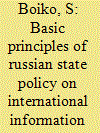

|
|
|
|
|
| Summary/Abstract |
National Security Strategic Planning Documents on the Basic Principles of Russian State Policy in the Field of International Information Security
ON JULY 24, 2018, it was five years since the approval by the president of the Russian Federation in 2013 of a key strategic planning document in the sphere of national security called Basic Principles of State Policy of the Russian Federation in the Field of International Information Security to 2020.1 Ensuring international information security in today's conditions of unprecedented increase in information security threats is of primary importance for achieving national security. This conclusion is confirmed by the provisions of the main strategic planning document in the area of security, the National Security Strategy of the Russian Federation as approved by Presidential Decree No. 683 of December 31, 2015,2 and by a number of other similar documents.
|
|
|
|
|
|
|
|
|
|
|
|
|
|
|
|
| 3 |
ID:
046342


|
|
|
|
|
| Publication |
London, Prentice Hall, 2002.
|
| Description |
xiii, 257p.hbk
|
| Standard Number |
0130460788
|
|
|
|
|
|
|
|
|
|
|
|
Copies: C:1/I:0,R:0,Q:0
Circulation
| Accession# | Call# | Current Location | Status | Policy | Location |
| 046326 | 973/COR 046326 | Main | On Shelf | General | |
|
|
|
|
| 4 |
ID:
080331
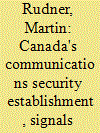

|
|
|
|
|
| Publication |
2007.
|
| Summary/Abstract |
Canada's Communications Security Establishment has undergone a far-reaching transformation in conjunction with the expanded role of Signals Intelligence in the global 'war on terror'. For the first time, Canada adopted a formal statute for CSE, including an expanded remit for countering terrorism. With a shift in targeting priorities towards terrorism and threats to Canadian interests abroad, Canada's participation in SIGINT-related international partnerships takes on new significance. The collection of communication intelligence touches upon public sensibilities regarding privacy rights of Canadians. The evolution of Canadian SIGINT capabilities was therefore accompanied by the establishment, as early as 1996, of a system for intelligence accountability and review, the Office of the CSE Commissioner. Recent advances in communications technology and pressing requirements for Signals Intelligence have impelled changes in the law, while also accentuating the role played by the CSE Commissioner in scrutinizing CSE activities to ensure compliance with ministerial authorizations and the laws of Canada
|
|
|
|
|
|
|
|
|
|
|
|
|
|
|
|
| 5 |
ID:
046810
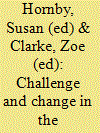

|
|
|
|
|
| Publication |
London, Facet Publishing, 2003.
|
| Description |
xvi, 239 p.
|
| Standard Number |
085604453x
|
|
|
|
|
|
|
|
|
|
|
|
Copies: C:1/I:0,R:0,Q:0
Circulation
| Accession# | Call# | Current Location | Status | Policy | Location |
| 046868 | 303.4/HOR 046868 | Main | On Shelf | General | |
|
|
|
|
| 6 |
ID:
067283
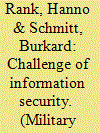

|
|
|
| 7 |
ID:
080594
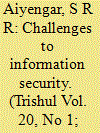

|
|
|
| 8 |
ID:
080600
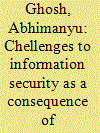

|
|
|
| 9 |
ID:
108632
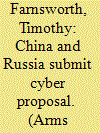

|
|
|
|
|
| Publication |
2011.
|
| Summary/Abstract |
China and Russia surprised the international community last month when they submitted a letter at the UN General Assembly outlining a proposal for an International Code of Conduct for Information Security.
The Sept. 12 proposal, which was supported by Tajikistan and Uzbekistan, came less than two months before the first major international conference on establishing international norms in cyberspace is set to take place in London.
|
|
|
|
|
|
|
|
|
|
|
|
|
|
|
|
| 10 |
ID:
105605
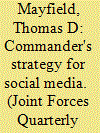

|
|
|
| 11 |
ID:
053130
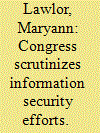

|
|
|
| 12 |
ID:
137403
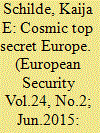

|
|
|
|
|
| Summary/Abstract |
As the EU has expanded its authority into areas of high politics such as monetary, defense, and foreign policy, it has simultaneously developed procedures for handling more sensitive and classified information. These critical policy domains require standards regulating secure information and personnel, but the concept of official secrets is in tension with the treaty norms of the EU. Observers allege that the classified information policy of the EU was imposed through the coercion of external actors such as North Atlantic Treaty Organization (NATO) and the USA in a significant historical departure from the information security policies of European member states. This article evaluates the content of EU-classified information policies and compares them to the content of European member states, NATO, and the USA, in an effort to clarify the mechanisms of policy diffusion in the area of information security.
|
|
|
|
|
|
|
|
|
|
|
|
|
|
|
|
| 13 |
ID:
144666
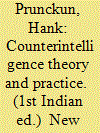

|
|
|
|
|
| Edition |
1st Indian ed.
|
| Publication |
New Delhi, Pentagon Press, 2014.
|
| Description |
xv, 239p.hbk
|
| Standard Number |
9788182747920
|
|
|
|
|
|
|
|
|
|
|
|
Copies: C:1/I:0,R:0,Q:0
Circulation
| Accession# | Call# | Current Location | Status | Policy | Location |
| 058638 | 327.12/PRU 058638 | Main | On Shelf | General | |
|
|
|
|
| 14 |
ID:
128705
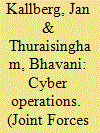

|
|
|
| 15 |
ID:
112576
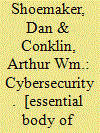

|
|
|
|
|
| Publication |
Australia, Course Technology, 2012.
|
| Description |
xxiv, 500p.Pbk
|
| Standard Number |
9781435481695
|
|
|
|
|
|
|
|
|
|
|
|
Copies: C:1/I:0,R:0,Q:0
Circulation
| Accession# | Call# | Current Location | Status | Policy | Location |
| 056531 | 005.8/SHO 056531 | Main | On Shelf | General | |
|
|
|
|
| 16 |
ID:
046385


|
|
|
|
|
| Publication |
London, Sage Publications, 2003.
|
| Description |
xi, 415p.
|
| Standard Number |
0761922202
|
|
|
|
|
|
|
|
|
|
|
|
Copies: C:1/I:0,R:0,Q:0
Circulation
| Accession# | Call# | Current Location | Status | Policy | Location |
| 046371 | 303.4833/SHY 046371 | Main | On Shelf | General | |
|
|
|
|
| 17 |
ID:
099956
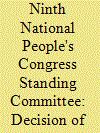

|
|
|
| 18 |
ID:
010413
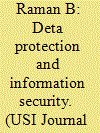

|
|
|
|
|
| Publication |
Jan-march 1996.
|
| Description |
77-85
|
|
|
|
|
|
|
|
|
|
|
|
|
|
|
|
| 19 |
ID:
078875
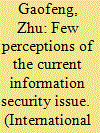

|
|
|
| 20 |
ID:
140996
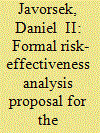

|
|
|
|
|
| Summary/Abstract |
Information security has quietly played a significant role in the development of the contemporary U.S. hegemony in world affairs. In addition to safeguarding its most vital technological advancements, information security has preserved its tactical advantage by protecting the “ways and means” of intelligence collection and served as the foundation for U.S. military dominance.1 In part due to these efforts, U.S. weapon systems have dominated the conventional battlefield since the end of the Cold War, but recent trends indicate this margin may be shrinking. Using defense related spending as a proxy for future military dominance; a recent study suggests that by 2035, U.S. spending could be eclipsed by a resurgent China that, at 2.3 million strong, already has the world's largest active military force.2
|
|
|
|
|
|
|
|
|
|
|
|
|
|
|
|